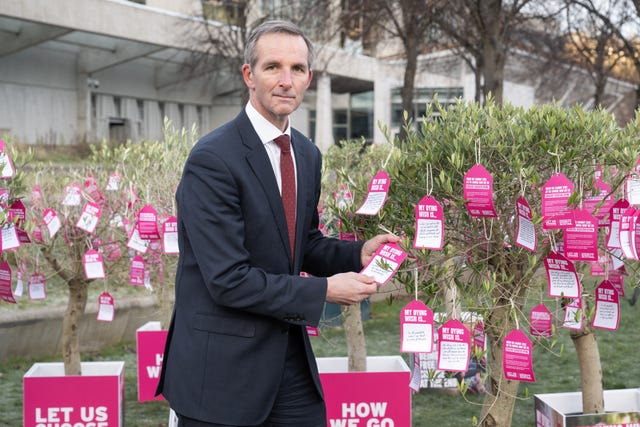Swinney will not support assisted dying Bill at Holyrood
The Scottish First Minister revealed his decision before a key vote on the legislation next week.

First Minister John Swinney has revealed he will vote against an attempt to legalise assisted dying for terminally ill Scots.
Mr Swinney spoke about his views as Holyrood prepares to vote for a third time on whether the law on the issue should be changed.
While he voted against previous attempts to bring in assisted dying, Mr Swinney said coming to a judgment on the latest Bill, brought forward by Liberal Democrat Liam McArthur, was “incredibly difficult”.
He spoke about the “agonising I have gone through on this issue” and stressed: “This is not a decision I have come to easily.”
He told journalists at Holyrood: “I have come to the conclusion I cannot support the Bill and will be voting against it on Tuesday.
“I have thought about the issue in principle, do I think it is appropriate for us to have provision in law for assisted dying?
“I have come to the conclusion in principle I don’t think we should have that.
“That is my individual view.”
The Scottish Parliament will vote on whether to support the general principles of the Assisted Dying for Terminally Adults (Scotland) Bill next week.
Mr McArthur’s Bill aims to allow those at the advanced stage of a terminal illness to seek help to end their life, but if it fails to win a majority in Tuesday’s vote it will not proceed any further.
Mr Swinney paid tribute to Mr McArthur, saying his “careful and diligent work” had led to a “much better Bill” than previous attempts.
But the First Minister said he is concerned backing such legislation would “fundamentally alter” the relationship between doctors and their patients “in an irrevocable and detrimental fashion”.

He also said: “I am concerned that those who are vulnerable in our society, and those who may consider themselves a burden to their families or to the state, may feel undue pressure to end their life prematurely.
“I can see no means of avoiding such a situation emerging in relation to the Bill.”
The First Minister also raised concerns that the courts could later expand the scope of the legislation beyond “the intentions of Parliament” – something he said would be an “undesirable situation”.
Mr Swinney stressed his decision on how to vote had not been one he “came to easily”.
With MSPs having a free vote on the matter, he made clear: “I only have one vote, the same as every other MSP in the chamber, and that is exactly how it should be on an issue like this.
“I do not set out my views today in order to seek to influence anyone else’s vote.
“I am simply conscious because I hold the office of First Minister people are understandably keen to hear what the First Minister thinks about the legislation.”
Opponents of assisted dying welcomed the First Minister’s stance, with Miro Griffiths, spokesman for the Better Way campaign group, saying: “It’s encouraging to see an experienced politician highlighting problems with ‘assisted dying’, including the potential for mission creep in legislation.
“The doubts MSPs have about the Bill before Holyrood are well founded – problems are not solvable.
“People would feel pressure to die due to inequality, coercion of vulnerable people could not be ruled out and eligibility criteria would be challenged in the courts.
“MSPs should vote down the dangerous and unworkable assisted dying Bill and focus on improving ethical and progressive forms of support.”
Mr McArthur said that given Mr Swinney’s opposition to previous Bills he had “always been aware that I was unlikely to win his support”.
The Liberal Democrat added: “Nevertheless, I would like to thank him for his considered approach, the time he has taken to discuss the issue with me, and his recognition that in this vote he does not speak for his party but solely on a personal basis.
“This is an issue on which an overwhelming majority of people of Scotland believe a change in the law is required.
“Public polling is consistent across age range, disability status, geographic area and religious belief: Scots want a change in the law to allow terminally ill people the choice of an assisted death.
“This Bill has been a long time coming but it does now offer the opportunity to provide that compassionate choice for the small number of terminally ill Scots who need it.”





